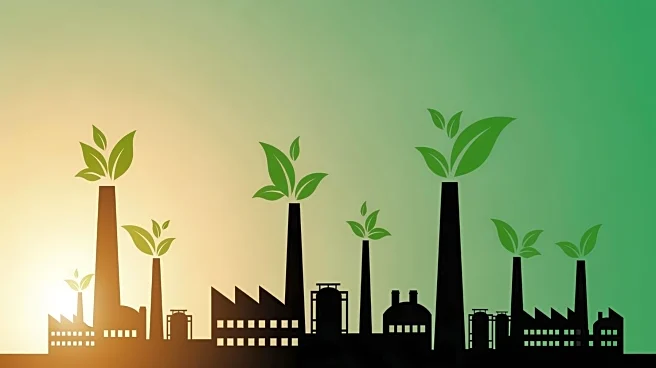What is the story about?
What's Happening?
On October 1, nine presidents and CEOs from American manufacturers of hardwood plywood, engineered wood flooring, and hardwood veneer requested President Trump to include their industry’s products in the Section 232 tariffs on wood products. This appeal comes amid concerns that over 100,000 American manufacturing jobs are at risk due to the influx of dumped and subsidized decorative hardwood product imports from outside North America. Roseburg Forest Products recently cited this import flood, which dominates 80% of the U.S. market, as the reason for closing their last hardwood plywood mill. Jeremy Manthei, CEO of Manthei Wood Products, emphasized the impact of unfair trade practices on mill workers, loggers, and rural communities, noting a significant reduction in veneer mills in regions like Michigan and Wisconsin.
Why It's Important?
The request for tariffs highlights the ongoing struggle of U.S. wood manufacturers against foreign competition, particularly from countries engaging in dumping and subsidies. Implementing Section 232 tariffs could provide a protective measure for domestic manufacturers, potentially preserving jobs and stabilizing the industry. The closure of mills, such as Roseburg Forest Products, underscores the economic vulnerability faced by rural communities reliant on these industries. If tariffs are imposed, it could lead to a resurgence in domestic production, benefiting local economies and safeguarding livelihoods.
What's Next?
If President Trump decides to implement the requested tariffs, it could lead to a shift in the competitive landscape for U.S. wood manufacturers. This action may prompt foreign producers to reconsider their pricing strategies or production locations. Additionally, domestic manufacturers might experience a boost in demand, encouraging investment and expansion. However, the decision could also provoke international trade tensions, potentially leading to retaliatory measures from affected countries.
Beyond the Headlines
The broader implications of this tariff request involve ethical considerations regarding fair trade practices and the balance between protecting domestic industries and fostering international trade relations. Long-term shifts could include increased scrutiny on trade agreements and a reevaluation of global supply chains, as countries seek to protect their industries from similar challenges.














